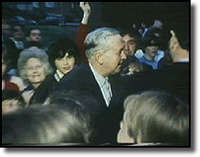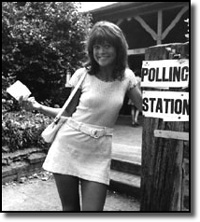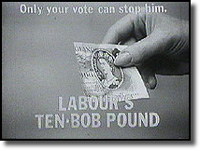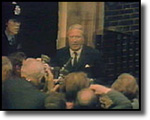
|
18 June 1970After some difficult times in office, Labour's fortunes began to pick up as the general election approached. Prime Minister Harold Wilson was confident of victory but Labour's lead in the opinion polls proved to be shaky. Poor economic figures released just before the election tipped the balance decisively towards the Conservatives. Edward Heath won a surprise victory, landing himself a safe 30-seat majority in the Commons.
Background
The Government performed badly in local elections, by-elections (Labour lost 16 seats between 1966-1970) and opinion polls. Even Labour supporters had plenty of reasons to be dissatisfied with Labour's record. These included the failure of Economic Affairs' Secretary George Brown's National Plan, Labour's attempt to put an end to poor industrial relations with the collapse of In place of strife and Wilson's support of the Americans in the Vietnam war. The Conservatives under Edward Heath were confident of victory at the next election, although the Tories were not without their own problems. Heath was not personally popular with the voters and Enoch Powell became a constant embarrassment to the Conservatives. Powell, a member of Heath's shadow cabinet, was horrified by the number of people seeking to enter the UK and believed Britain would come to suffer from race rioting similar to that in the USA. Powell's intolerant remarks on immigration and his opposition to Wilson's race relations legislation forced Heath to expel him from the shadow cabinet. As the elections approached Labour's fortunes began to revive. From the summer of 1969 the economy began to pick up as did the Government's standing in the polls. A good showing in the local elections in May 1970 convinced Wilson that Labour could win an early election, and the day was set for 18 June.
The Prime Minister was accompanied on most of his trips around Britain by his wife, highlighting his image as a family man, contrasting favourably with Heath the bachelor. As the campaign progressed, Wilson's cosy, reassuring style seemed to be working. The news reports and opinion polls suggested Wilson's strategy was working while Heath struggled to keep up.
Despite this, senior Tories were worried that their campaign had yet to take off. They decided to press on with their use of the economy and prices as the main battleground of the election. Retail prices increased by a record 2.1% in May, leading Heath to call for a "shopping basket election". The Tories used the tribulations of the housewife for the subject of one of their party political broadcasts. Roy Jenkins fired back at the Tories, claiming they would add 20% VAT on many goods and services. Labour also costed the Tory policies and concluded they would add an extra nine pence to income tax. Enoch Powell used his election address to repeat his demands to end immigration. Powell's latest calls were condemned in a speech by Tony Benn, the Minister for Technology. More Powell speeches followed and the media even called on Heath to withdraw his endorsement of Enoch Powell as a Conservative candidate. The Tory leader maintained that although his views were different from those of Powell, he would maintain his endorsement. Meanwhile, the Prime Minister had his own problems. The Society of Graphical and Allied Trades were demanding an interim wage increase of 25% for its London-based workers. Wilson was forced to take time out of his campaign to conduct negotiations; although the dispute was finally settled, no national newspapers were published for four days. As the campaign progressed, more and more journalists began to run down the Tories' chances of victory. But slowly, and almost imerceptibly, the tide began to turn against Labour. The public's mood changed when trade figures released three days before polling showed that after a nine-month run of good returns, there had been a £31 million trade deficit for May. The Tory claim that Labour was unable to manage the economy carried new force. Edward Heath voiced the concern that if Labour were re-elected, sterling may face a second devaluation. The Prime Minister responded that the Conservatives were unpatriotically staging a run on the pound but the Tory attacks hit home. The public was beginning to feel uneasy about the future of the economy under Labour. Poor unemployment figures, released in the campaign's final week, further reinforced the Tory message that Labour would wreck the economy. Although the difference between Labour and the Tories in the opinion polls shrank during the campaign, Labour still expected to win the election. Even most Tories - with the notable exception of Edward Heath - felt they had failed to overcome the Prime Minister's personal popularity, believing their warnings about the economy had not sufficiently strong.
On the day, Edward Heath won a remarkable victory and the Conservatives were once more returned to office. The Conservatives won 330 seats to Labour's 287. Overall there was a swing of 4.7% from Labour to the Conservatives. The Liberals won just 6 seats and the Scottish and Welsh Nationalists also did poorly, despite their strong performance in by-elections. New faces included future Labour leaders John Smith and Neil Kinnock and future Conservative Cabinet Ministers Kenneth Clarke, Kenneth Baker, Norman Fowler and Geoffrey Howe.
The result was a deep shock for Labour, and for the pollsters. The low turnout certainly didn't help Labour and the poor trade figures released just three days before polling may have been the deciding factor for many floating voters when choosing between Labour and Conservative. The figures backed up Conservative claims that the economy would suffer if Labour should win again. For Edward Heath, derided by many commentators, the election represented a personal victory. With a solid majority of 30, he could expect to govern uninterrupted for a full term.
|
Diana, Princess of Wales, 1961-1997
Conference 97
Devolution
The Archive
News |
Issues |
Background |
Parties |
Analysis |
TV/Radio/Web
Interactive |
Forum |
Live |
About This Site
News |
Issues |
Background |
Parties |
Analysis |
TV/Radio/Web
Interactive |
Forum |
Live |
About This Site
© BBC 1997 |
politics97@bbc.co.uk |



